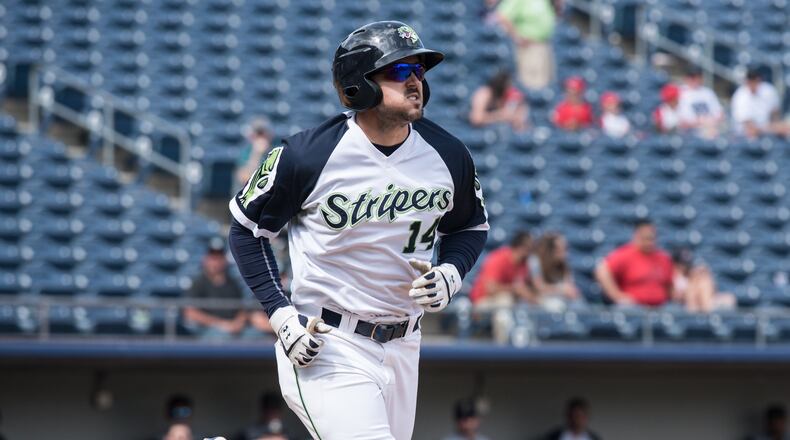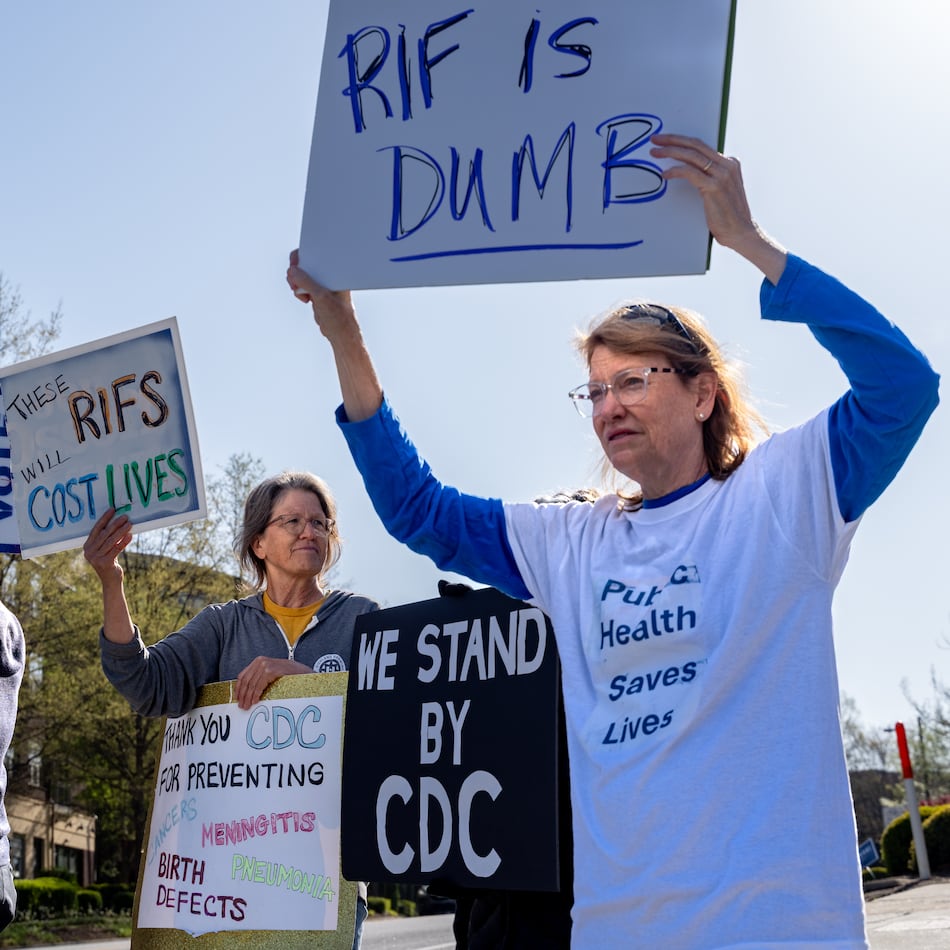Adam Duvall didn’t view his prolonged Triple-A assignment as banishment. It was instead a four-month trek to rediscover himself.
The Braves outfielder, acquired at last season’s trade deadline, hasn’t made his mark in the organization. His second half, in which he playing sparingly and struggled to adjust as a pinch-hitter, was abysmal.
Duvall surprisingly was tendered a contract in the winter. He didn’t make the team out of spring training, but he was retained in the organization for depth purposes. And when Nick Markakis fractured his wrist Friday, keeping Duvall around proved wise. He joined the team in Philadelphia and started in left field Saturday.
“Obviously that’s not the way you want to get the news, but when they told me I was excited,” Duvall said. “It’s a good opportunity. I just want to make the most of it.”
» Braves make big roster moves Saturday
Let’s back up a bit: Duvall has a pair of 30-homer seasons under his belt. He’s been an All-Star. He’s been a Gold Glove finalist as recently as last year. When the Reds traded him to the Braves, he entered a new bench situation for which he wasn’t fit.
Duvall came into spring vying for a spot, the chance to show last year’s struggles were a fluke. He hit .171 with two homers – in the same game – and four RBIs in 19 spring-training games. The team sent him to Triple-A and essentially told him to wait.
“It was tough at first,” Duvall said. “Like anything, when you get punched in the gut, it’s not the best feeling in the world. I took it as, I need to get better. I got some confidence back and I’m happy where I’m at.”
Ultimately, it would benefit the lost slugger. He maintained a positive attitude and took the challenge in stride.
He launched 29 home runs, setting a new Gwinnett Stripers record, and knocked in 84 runs. For as discombobulated as he looked in August and September, he became an offensive force through 94 games in the International League.
Duvall adjusted his approach, changing his mechanics and mentality. He feels he knows himself better than before; that when the inevitable slump occurs, he’ll be best positioned to handle it. He better understands himself as a player.
“Some of my thoughts of what I was doing weren’t actually what I was doing,” he said. “When I started to slump, I didn’t have a base to go back to. And now I feel like I have a pretty good idea of my swing as far as my setup and how I’ll approach the ball. I’ve watched a lot of swings since I’ve been down there. I’ve had time to analyze the swings.
“It was good to be penciled in every day, get in that groove and get back to being myself. That was exciting to me. Just having the success that I had.”
The new-and-possibly-improved Duvall will be tossed into the fire. Manager Brian Snitker intends to give him ample playing time to prove himself. For Duvall, this is likely his last chance at carving out a role with the organization.
His last stint in the majors included a .132 average with a .344 OPS in 33 games for the Braves last season. Duvall wasn’t uncomfortable, he said, and while he won’t admit it, inconsistent at-bats were a factor. After his epiphany at Triple-A, the 30-year-old is well-positioned for redemption.
“It’d benefit us to see where he’s at,” Snitker said. “I admire the heck out of him for what he did (at Triple-A). He just went down there and just played. That speaks volumes to the player he is. You didn’t hear about him. All he did was go down, did his job and did really well. You’d hear about his performance.
“That’s the way it should be. A lot of times in that situation, it’s not easy for a guy to have the success that he has up here to go down there and put into it what he did. That’s really something special.”
Duvall’s avenge tour began Saturday in Philadelphia. He’ll play mostly in left field, with Ronald Acuna handling the now-vacated right. In theory, Duvall adds another power element to an already deep lineup in the pop department.
The restored hope doesn’t equate to guaranteed production. This chapter of Duvall’s career could go a number of ways. But he’s injected with newfound confidence, a feeling that he knows himself better than before.
That, he feels, could make all the difference.
“I feel like I have a better idea of how my swing works than I did in the past,” he said. “I don’t want to say I have all the answers. I just feel like I have a better idea of who I am and how my swing works.”
About the Author
Keep Reading
The Latest
Featured




